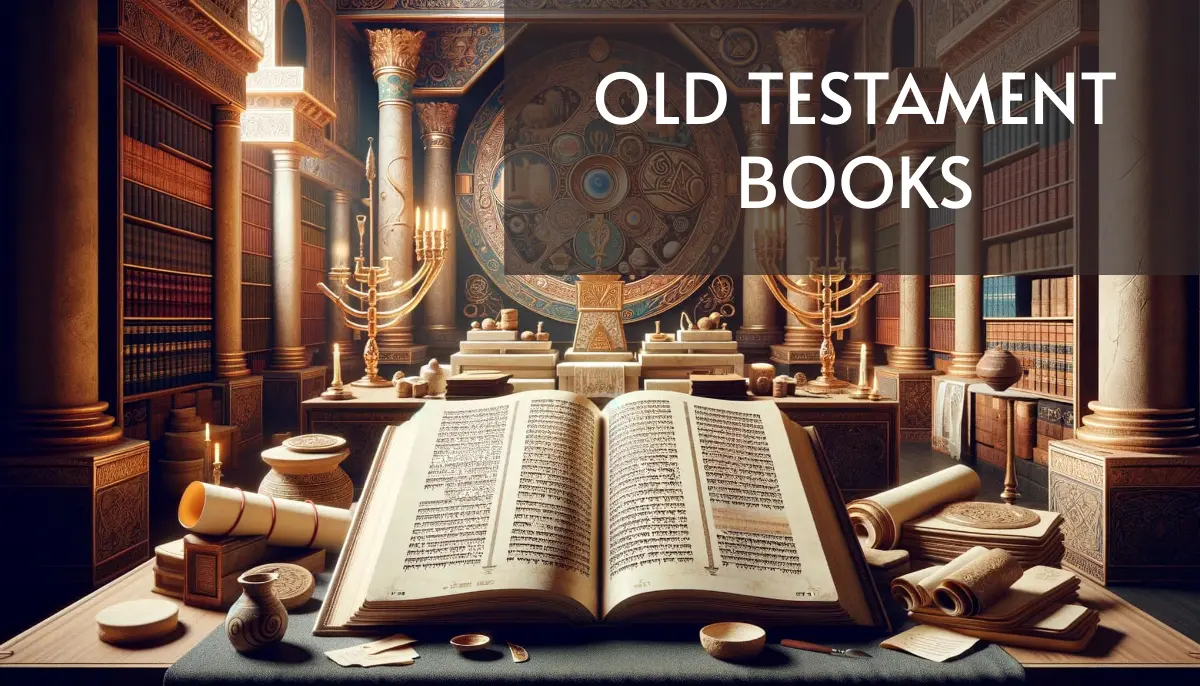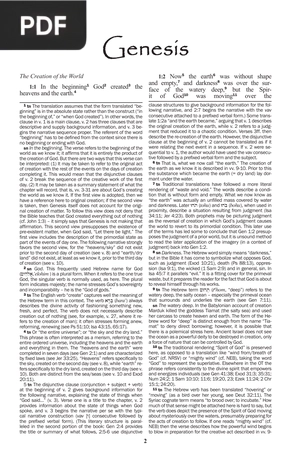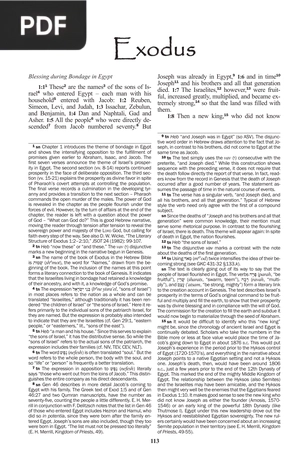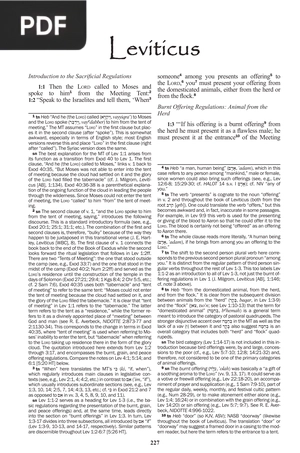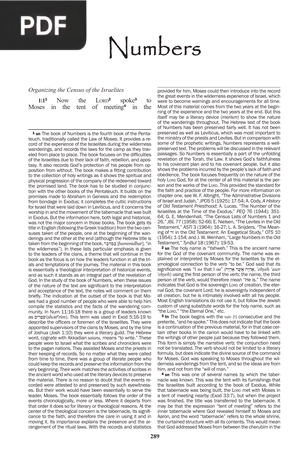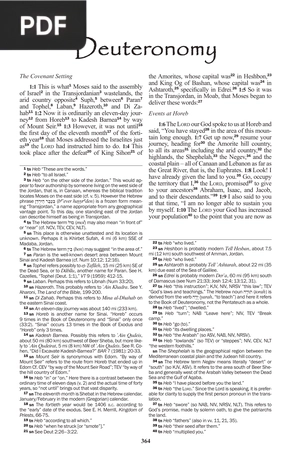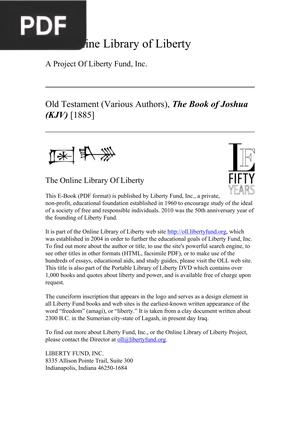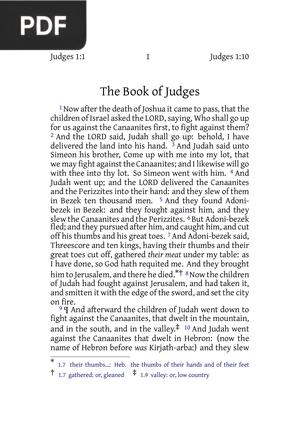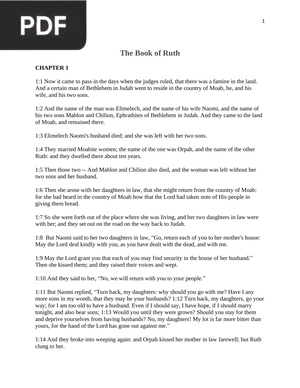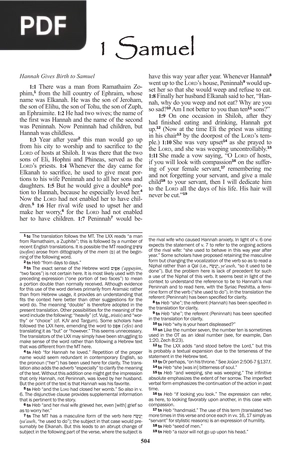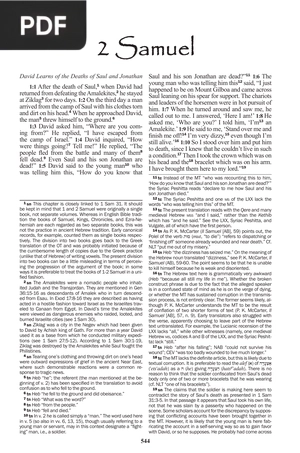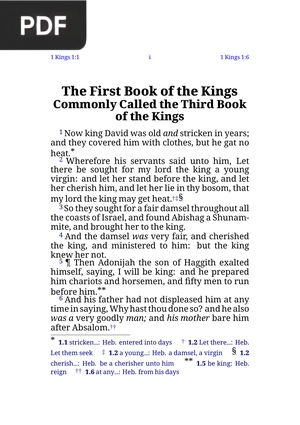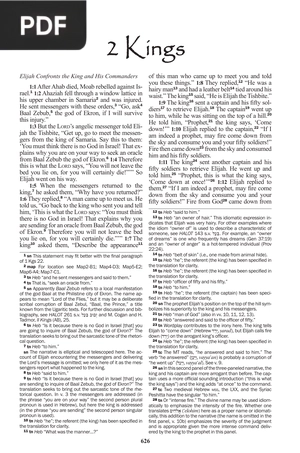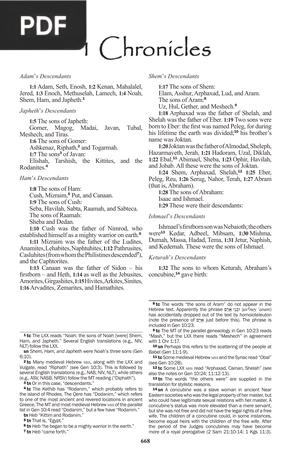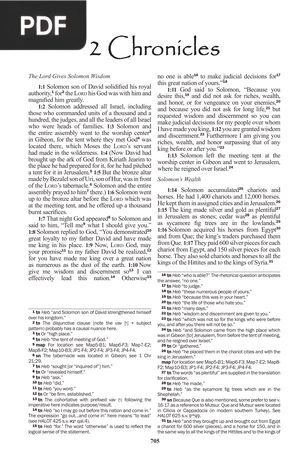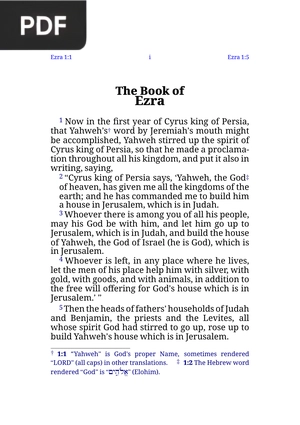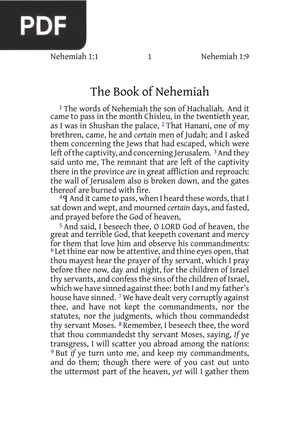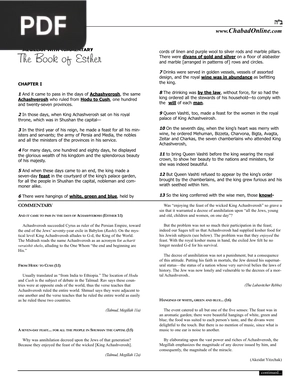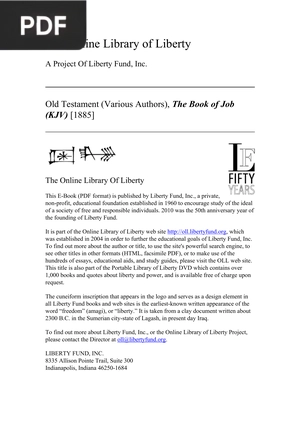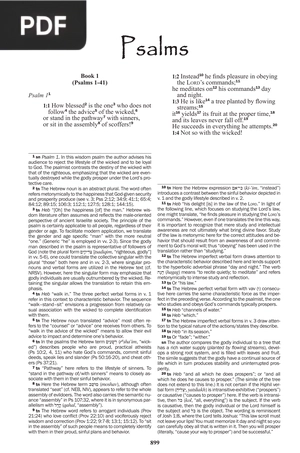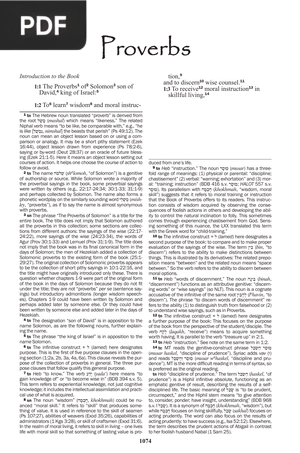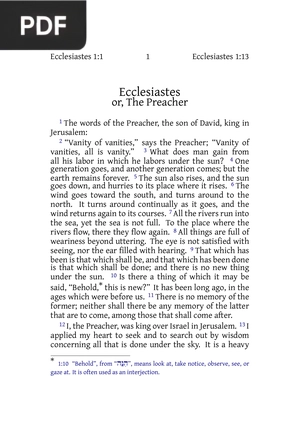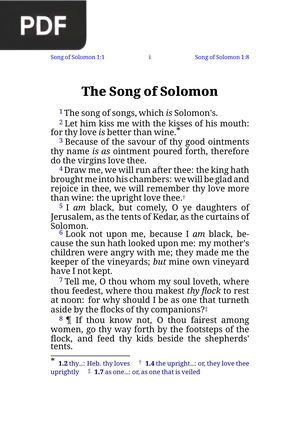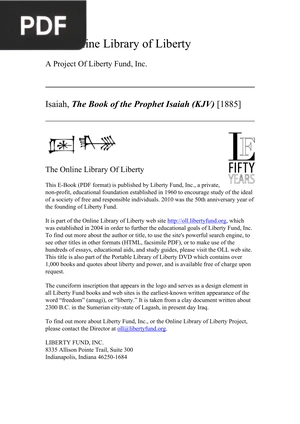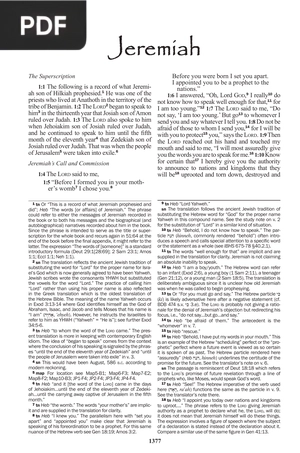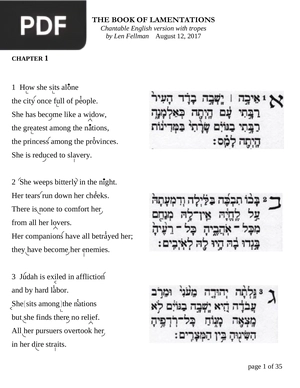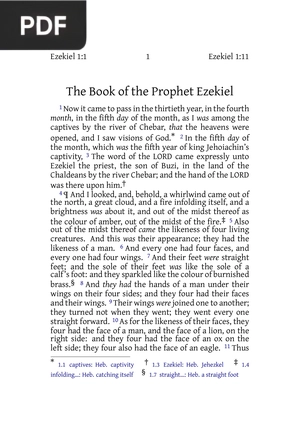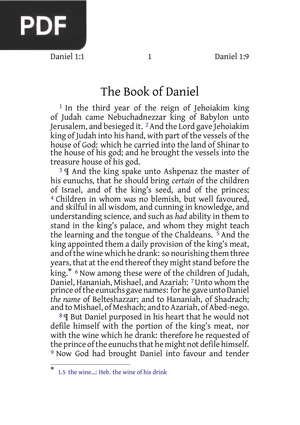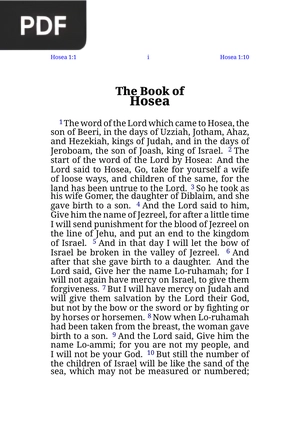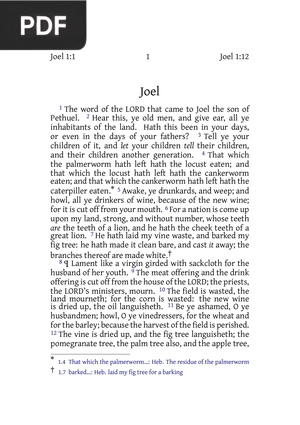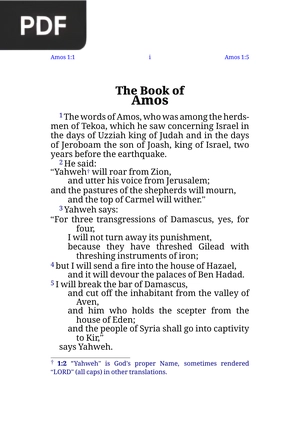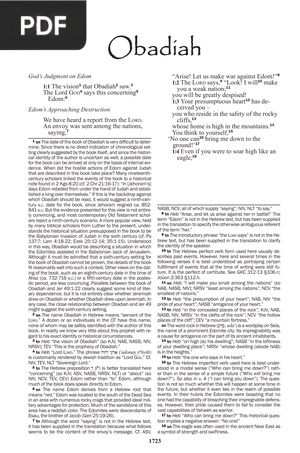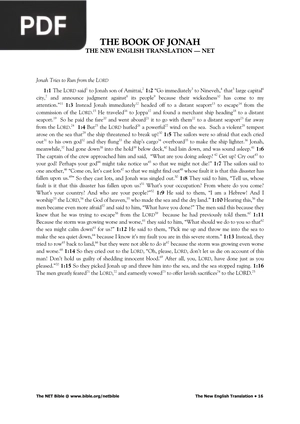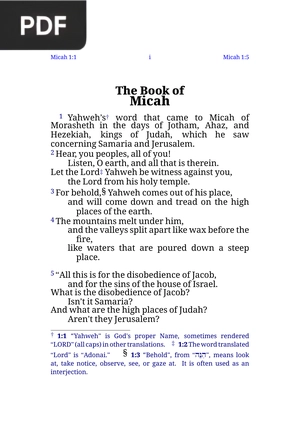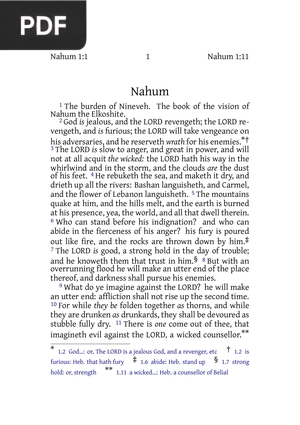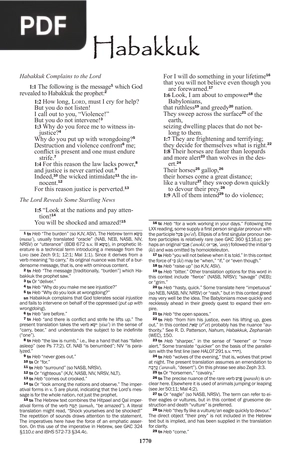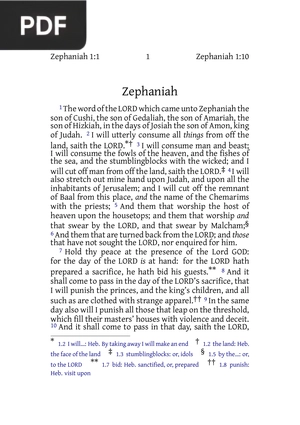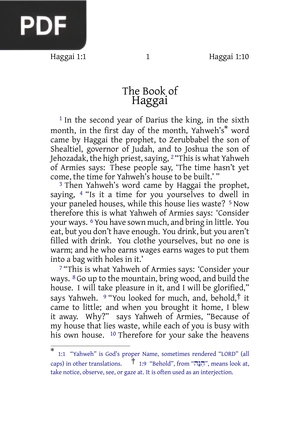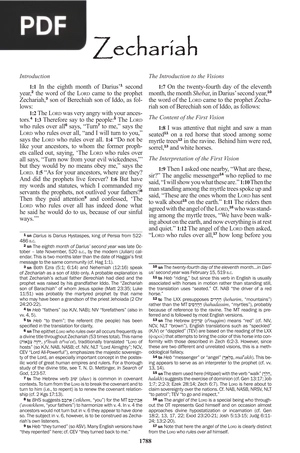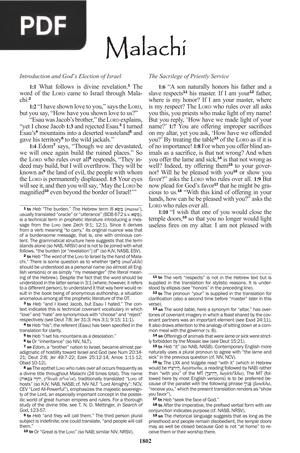Dive into the fascinating world of the Old Testament with our collection of Old Testament books in PDF.
The Old Testament encompasses a rich variety of texts that narrate the history, law, and wisdom of the people of Israel, offering a unique insight into the faith and Jewish tradition.
We invite you to explore our selection of books that include genres such as historical narrative, poetry, prophecy, and wisdom, providing a comprehensive perspective of this important period in religious history.
Discover the cultural and spiritual richness of the Old Testament by downloading these books for free, without any complications or registrations required.
Download your Old Testament books in PDF and immerse yourself in the ancient wisdom of these sacred scriptures.
Pentateuch
The Pentateuch is the word designated to refer to the first five books of the Bible, which were written by Moses, and are part of the Old Testament. These books are Genesis, Exodus, Leviticus, Numbers and Deuteronomy.
Each book of the Pentateuch has a particular theme, but all of them, in common, describe supernatural events such as miracles, judgments, destruction of cities, liberation of slaves, establishment of laws, and other things of the time.
Often, the Pentateuch is used as a source of useful and historical information to learn about topics such as God’s creation of the world, Genesis flood narrative (Noah’s Ark), the formation of languages, etc., as well as to learn about the origin of the Jewish nation, which is described there and remains even today.
#1 Genesis
Extension: PDF | 111 pages
Genesis is a foundational text that chronicles the creation of the world, the stories of the patriarchs, and the establishment of the relationship between God and humanity.
#2 Exodus
Extension: PDF | 114 pages
Exodus is an Old Testament book that tells of the liberation of the Israelites from slavery in Egypt and the giving of the Ten Commandments at Mount Sinai.
#3 Leviticus
Extension: PDF | 62 pages
Leviticus is an Old Testament book that establishes ritual and ethical laws for the Israelites, including regulations on sacrifice, purity, and holiness.
#4 Numbers
Extension: PDF | 75 pages
Numbers is the fourth book of the Old Testament that recounts the census of the Israelites in the wilderness and their pilgrimage to the Promised Land, including key events and divine laws.
#5 Deuteronomy
Extension: PDF | 57 pages
Deuteronomy is the fifth book of the Old Testament that contains speeches by Moses addressed to the Israelites before entering the Promised Land, reaffirming the importance of obedience to God and the established laws.
Historical books
The Historical books of the Bible are books that make up the Old Testament. They contain a proper historical value, where the reader can learn about important events of great relevance that took place in the Middle East many years ago.
They largely comprise the history of the Jewish nation, which is Israel, and describe in them a long period of this nation. It names important people such as David, who was king of Israel at that time, his son Solomon, as the wisest man of that time, and also tells of the wars they had with enemies that inhabited their surroundings.
The books that are part of the historical books were written by several authors through the years, where many of them never met each other.
#1 Joshua
Extension: PDF | 71 pages
Joshua tells the story of Joshua, Moses' successor, leading the Israelites in the conquest of Canaan, highlighting the importance of faith, obedience, and fidelity to God.
#2 Judges
Extension: PDF | 63 pages
Judges tells the story of the leaders and judges who ruled Israel between the death of Joshua and the rise of the monarchy, highlighting cycles of sin, oppression, repentance, and liberation.
#3 Rut
Extension: PDF | 6 pages
Ruth tells the story of Ruth, a Moabite woman who shows loyalty to her mother-in-law Naomi and finds redemption through faithfulness and divine providence, highlighting themes of love, loyalty, and belonging to God's people.
#4 1 Samuel
Extension: PDF | 40 pages
1 Samuel, chronicles the transition of Israel's leadership from judges to monarchy, featuring figures such as Samuel, Saul, and David, highlighting themes of obedience, power, and the relationship between the people and God.
#5 2 Samuel
Extension: PDF | 40 pages
2 Samuel chronicles David's reign as king of Israel, showing his victories, failures, and relationship with God, highlighting themes of power, repentance, and divine faithfulness in the midst of adversity.
#6 1 Kings
Extension: PDF | 102 pages
1 Kings tells the story of the kings of Israel after the death of David, showing the division of the kingdom, the reigns of Solomon, Jeroboam, and others, highlighting themes of loyalty, idolatry, and the importance of obedience to God.
#7 2 Kings
Extension: PDF | 42 pages
2 Kings tells the continuing story of the kings of Israel and Judah, addressing reigns, prophecies, and supernatural events, highlighting themes of rebellion, divine punishment, and the importance of faith in difficult times.
#8 1 Chronicles
Extension: PDF | 37 pages
1 Chronicles is a genealogical record and historical narrative that emphasizes the importance of worship, God's faithfulness, and the continuity of divine promise through the generations in Israel.
#9 2 Chronicles
Extension: PDF | 43 pages
2 Chronicles tells the story of the kings of Judah, focusing on the importance of the temple, the worship of God, the mistakes of leaders, and divine faithfulness despite human transgressions.
#10 Ezra
Extension: PDF | 32 pages
Ezra recounts the return of the exiles to Jerusalem, the rebuilding of the temple, and the restoration of God's law, highlighting the importance of obedience and worship in the lives of the people of Israel.
#11 Nehemiah
Extension: PDF | 36 pages
Nehemiah recounts the rebuilding of the walls of Jerusalem under the leadership of Nehemiah, highlighting the importance of perseverance, prayer, and spiritual restoration of the Jewish people.
#12 Esther
Extension: PDF | 14 pages
Esther tells the story of Esther, a young Jewish girl who becomes queen of Persia and saves her people from genocide, highlighting courage, divine providence, and loyalty to Jewish identity.
Sapiential Books
The Sapiential books are located after the historical books, and constitute one of the most beautiful literary prose in history, it has a huge consideration worldwide for the rich poetry that can be found in them, the book of Song of Songs is an example.
In this division of books, we find two of the most quoted books, Psalms and Proverbs, which were mostly written by King David and King Solomon respectively. Both contain great literary richness and were written as lived experiences of their authors.
We also find there the famous book of Job, which is a widely read book, which helps people to have an idea of the sorrows of life and how God is in absolute control of human life.
#1 Job
Extension: PDF | 104 pages
Job tells the story of Job, a righteous man who faces extreme trials and questions human suffering, exploring themes of faith, divine justice, and perseverance in the face of adversity.
#2 Psalms
Extension: PDF | 175 pages
Psalms is a collection of poems and songs that address themes of praise, adoration, supplication, gratitude and spiritual reflection, being relevant for its profound expression of the individual's relationship with the divine.
#3 Proverbs
Extension: PDF | 109 pages
Proverbs is a collection of poetic wisdom that offers practical advice on life, morals, conduct and wisdom, being relevant for its focus on ethical and moral instruction.
#4 Ecclesiastes
Extension: PDF | 19 pages
Ecclesiastes is a philosophical reflection that questions the meaning of life, human purpose and the nature of existence, being relevant for its existential exploration and its focus on the search for meaning in the midst of uncertainty.
#5 Song of Songs (Canticle of Canticles)
Extension: PDF | 14 pages
Song of Songs is a collection of lyric poems that celebrate the love and passion between a lover and his beloved, using poetic metaphors to express the beauty and intensity of human relationships.
Major Prophets
A prophet is a messenger of God, who is in charge of revealing God’s Will to the people. In the Old Testament we are told about people who held this office, among whom there are major prophets and minor prophets.
The Major Prophets are those who, in their time, were chosen by God to give accurate and timely messages to the nation of Israel. They are called Major Prophets because their office covered a long time in the Jewish nation, there were prophets who prophesied to complete reigns and their successors.
The books that compose this division were written by the prophets themselves, and among them, the most renowned were Isaiah, Jeremiah, Ezekiel and Daniel. All their prophecies can be found and read in the Bible.
#1 Isaiah
Extension: PDF | 130 pages
Isaiah is a collection of prophecies and poetry that address themes of redemption, divine judgment, comfort, and hope for the people of Israel.
#2 Jeremiah
Extension: PDF | 174 pages
Jeremiah is a collection of prophecies and lamentations that address the disobedience of the people of Israel, divine judgment, and the promise of restoration.
#3 Lamentations
Extension: PDF | 35 pages
Lamentations is a collection of lamentative poems expressing the pain and affliction of the people of Israel following the destruction of Jerusalem.
#4 Ezekiel
Extension: PDF | 128 pages
Ezekiel is a collection of prophecies and visions addressing the fall of Jerusalem, the restoration of Israel, and the divine presence.
Minor Prophets
The Minor Prophets are those who gave messages to the Jewish nation for a short period of time, their work did not last as long in comparison with the major prophets, but even so, their messages had an important relevance in the history of the Jews, after all, it was God’s message.
The number of books varies with respect to the major prophets, being many more in comparison. Each book has the authorship of the prophet, and in it you can appreciate both the message of God, and the reaction of the Jews to that message.
It should be noted that many of them were also considered post-exilic prophets, because their time of prophecy was made after the Jews were exiled and taken captive by the nation of Babylon.
#1 Hosea
Extension: PDF | 20 pages
Hosea is a collection of prophecies and metaphors that address the unfaithfulness of the people of Israel, divine mercy and restoration, being relevant for its focus on the relationship between God and his people, highlighting the importance of faithfulness and repentance.
#2 Joel
Extension: PDF | 8 pages
Joel is a collection of prophecies addressing the locust invasion, the day of the Lord, and the restoration of Israel.
#3 Amos
Extension: PDF | 20 pages
Amos is a collection of prophecies that denounce social injustice, oppression and lack of religious ethics.
#4 Obadiah (Abdias)
Extension: PDF | 5 pages
Obadiah is a short prophecy that condemns the pride of Edom and proclaims divine justice, being relevant for its message of judgment and restoration in the Old Testament prophetic tradition.
#5 Jonah (Jonas)
Extension: PDF | 16 pages
Jonah tells the story of the prophet who flees from his mission, is swallowed by a large fish and finally fulfills the divine commission in Nineveh, highlighting God's mercy and forgiveness.
#6 Micah
Extension: PDF | 17 pages
Micah prophesies about social injustice, corruption, and the future restoration of Israel.
#7 Nahum
Extension: PDF | 6 pages
Nahun prophesies about the destruction of Nineveh due to its evil, highlighting divine justice and judgment on the nations.
#8 Habakkuk (Habacuc)
Extension: PDF | 7 pages
Habakkuk questions divine justice in the face of evil, trusting in the sovereignty of God, relevant for his reflection on faith, justice and trust in times of adversity.
#9 Zephaniah (Sophonias)
Extension: PDF | 7 pages
Zephaniah announces judgment and restoration, emphasizing divine justice and hope.
#10 Haggai (Aggaeus)
Extension: PDF | 5 pages
Haggai urges rebuilding the Jerusalem Temple, focusing on spiritual priority.
#11 Zechariah (Zacharias)
Extension: PDF | 14 pages
Zechariah contains apocalyptic visions and promises of restoration, highlighting redemption and hope.
#12 Malachi (Malachias)
Extension: PDF | 5 pages
Malachi addresses apostasy, divine judgment, and the coming of the Messiah.
Books of the Old Testament in Spanish
| To access the collection of Books of the Old Testament in Spanish, we invite you to visit: Books of the Old Testament in Spanish [PDF]
Books of the Old Testament in Portuguese
| To access the collection of Books of the Old Testament in Portuguese, we invite you to visit: Books of the Old Testament in Portuguese [PDF]
Well, this was our collection of all the Old Testament books in PDF format. We hope you liked it and find your next book!
If you found this list useful, don’t forget to share it in your social networks. Remember that «Sharing is Caring».
Do you want books on Religion in PDF format?


